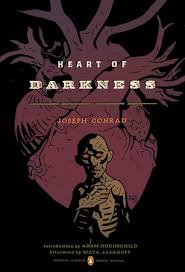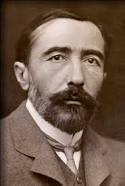Heart of Darkness Page #14
Heart of Darkness is a novella by Polish-British novelist Joseph Conrad, about a voyage up the Congo River into the Congo Free State, in the heart of Africa, by the story's narrator Charles Marlow.
“The earth seemed unearthly. We are accustomed to look upon the shackled form of a conquered monster, but there--there you could look at a thing monstrous and free. It was unearthly, and the men were--No, they were not inhuman. Well, you know, that was the worst of it--this suspicion of their not being inhuman. It would come slowly to one. They howled and leaped, and spun, and made horrid faces; but what thrilled you was just the thought of their humanity--like yours--the thought of your remote kinship with this wild and passionate uproar. Ugly. Yes, it was ugly enough; but if you were man enough you would admit to yourself that there was in you just the faintest trace of a response to the terrible frankness of that noise, a dim suspicion of there being a meaning in it which you--you so remote from the night of first ages--could comprehend. And why not? The mind of man is capable of anything--because everything is in it, all the past as well as all the future. What was there after all? Joy, fear, sorrow, devotion, valour, rage--who can tell?--but truth--truth stripped of its cloak of time. Let the fool gape and shudder--the man knows, and can look on without a wink. But he must at least be as much of a man as these on the shore. He must meet that truth with his own true stuff--with his own inborn strength. Principles won't do. Acquisitions, clothes, pretty rags--rags that would fly off at the first good shake. No; you want a deliberate belief. An appeal to me in this fiendish row--is there? Very well; I hear; I admit, but I have a voice, too, and for good or evil mine is the speech that cannot be silenced. Of course, a fool, what with sheer fright and fine sentiments, is always safe. Who's that grunting? You wonder I didn't go ashore for a howl and a dance? Well, no--I didn't. Fine sentiments, you say? Fine sentiments, be hanged! I had no time. I had to mess about with white-lead and strips of woolen blanket helping to put bandages on those leaky steam-pipes--I tell you. I had to watch the steering, and circumvent those snags, and get the tin-pot along by hook or by crook. There was surface-truth enough in these things to save a wiser man. And between whiles I had to look after the savage who was fireman. He was an improved specimen; he could fire up a vertical boiler. He was there below me, and, upon my word, to look at him was as edifying as seeing a dog in a parody of breeches and a feather hat, walking on his hind-legs. A few months of training had done for that really fine chap. He squinted at the steam-gauge and at the water-gauge with an evident effort of intrepidity--and he had filed teeth, too, the poor devil, and the wool of his pate shaved into queer patterns, and three ornamental scars on each of his cheeks. He ought to have been clapping his hands and stamping his feet on the bank, instead of which he was hard at work, a thrall to strange witchcraft, full of improving knowledge. He was useful because he had been instructed; and what he knew was this--that should the water in that transparent thing disappear, the evil spirit inside the boiler would get angry through the greatness of his thirst, and take a terrible vengeance. So he sweated and fired up and watched the glass fearfully (with an impromptu charm, made of rags, tied to his arm, and a piece of polished bone, as big as a watch, stuck flatways through his lower lip), while the wooded banks slipped past us slowly, the short noise was left behind, the interminable miles of silence--and we crept on, towards Kurtz. But the snags were thick, the water was treacherous and shallow, the boiler seemed indeed to have a sulky devil in it, and thus neither that fireman nor I had any time to peer into our creepy thoughts. “Some fifty miles below the Inner Station we came upon a hut of reeds, an inclined and melancholy pole, with the unrecognizable tatters of what had been a flag of some sort flying from it, and a neatly stacked wood-pile. This was unexpected. We came to the bank, and on the stack of firewood found a flat piece of board with some faded pencil-writing on it. When deciphered it said: 'Wood for you. Hurry up. Approach cautiously.' There was a signature, but it was illegible--not Kurtz--a much longer word. 'Hurry up.' Where? Up the river? 'Approach cautiously.' We had not done so. But the warning could not have been meant for the place where it could be only found after approach. Something was wrong above. But what--and how much? That was the question. We commented adversely upon the imbecility of that telegraphic style. The bush around said nothing, and would not let us look very far, either. A torn curtain of red twill hung in the doorway of the hut, and flapped sadly in our faces. The dwelling was dismantled; but we could see a white man had lived there not very long ago. There remained a rude table--a plank on two posts; a heap of rubbish reposed in a dark corner, and by the door I picked up a book. It had lost its covers, and the pages had been thumbed into a state of extremely dirty softness; but the back had been lovingly stitched afresh with white cotton thread, which looked clean yet. It was an extraordinary find. Its title was, An Inquiry into some Points of Seamanship, by a man Towser, Towson--some such name--Master in his Majesty's Navy. The matter looked dreary reading enough, with illustrative diagrams and repulsive tables of figures, and the copy was sixty years old. I handled this amazing antiquity with the greatest possible tenderness, lest it should dissolve in my hands. Within, Towson or Towser was inquiring earnestly into the breaking strain of ships' chains and tackle, and other such matters. Not a very enthralling book; but at the first glance you could see there a singleness of intention, an honest concern for the right way of going to work, which made these humble pages, thought out so many years ago, luminous with another than a professional light. The simple old sailor, with his talk of chains and purchases, made me forget the jungle and the pilgrims in a delicious sensation of having come upon something unmistakably real. Such a book being there was wonderful enough; but still more astounding were the notes pencilled in the margin, and plainly referring to the text. I couldn't believe my eyes! They were in cipher! Yes, it looked like cipher. Fancy a man lugging with him a book of that description into this nowhere and studying it--and making notes--in cipher at that! It was an extravagant mystery.
Translation
Translate and read this book in other languages:
Select another language:
- - Select -
- 简体中文 (Chinese - Simplified)
- 繁體中文 (Chinese - Traditional)
- Español (Spanish)
- Esperanto (Esperanto)
- 日本語 (Japanese)
- Português (Portuguese)
- Deutsch (German)
- العربية (Arabic)
- Français (French)
- Русский (Russian)
- ಕನ್ನಡ (Kannada)
- 한국어 (Korean)
- עברית (Hebrew)
- Gaeilge (Irish)
- Українська (Ukrainian)
- اردو (Urdu)
- Magyar (Hungarian)
- मानक हिन्दी (Hindi)
- Indonesia (Indonesian)
- Italiano (Italian)
- தமிழ் (Tamil)
- Türkçe (Turkish)
- తెలుగు (Telugu)
- ภาษาไทย (Thai)
- Tiếng Việt (Vietnamese)
- Čeština (Czech)
- Polski (Polish)
- Bahasa Indonesia (Indonesian)
- Românește (Romanian)
- Nederlands (Dutch)
- Ελληνικά (Greek)
- Latinum (Latin)
- Svenska (Swedish)
- Dansk (Danish)
- Suomi (Finnish)
- فارسی (Persian)
- ייִדיש (Yiddish)
- հայերեն (Armenian)
- Norsk (Norwegian)
- English (English)
Citation
Use the citation below to add this book to your bibliography:
Style:MLAChicagoAPA
"Heart of Darkness Books." Literature.com. STANDS4 LLC, 2024. Web. 23 Nov. 2024. <https://www.literature.com/book/heart_of_darkness_11>.




Discuss this Heart of Darkness book with the community:
Report Comment
We're doing our best to make sure our content is useful, accurate and safe.
If by any chance you spot an inappropriate comment while navigating through our website please use this form to let us know, and we'll take care of it shortly.
Attachment
You need to be logged in to favorite.
Log In